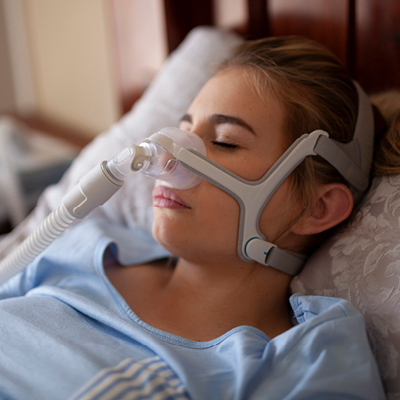Signs of sleep apnea: When is snoring something more serious?
Posted November 23, 2020 by Lisa Perri BS, RRT, RPSGT, RST

Does your partner snore — loudly? Do they snort throughout the night? If so, it could be more than an innocent annoyance. It could be a condition called obstructive sleep apnea. Loud, excessive snoring coupled with other symptoms, such as obesity and hypertension, could be a sign it’s something more.
Sleep apnea is a condition that causes your breathing to stop during sleep — sometimes up to several hundred times a night. When you stop breathing, your blood oxygen levels can drop abruptly during the night, which causes the brain to wake you up to breathe.
Sleep apnea is not only frustrating when you are trying to sleep, it can be very serious and negatively impact your partner’s health. If left untreated, sleep apnea can cause extreme fatigue and an increased risk of car accidents, as well as other significant side effects, such as a high risk of heart attacks, heart failure, and strokes.
The American Sleep Apnea Association estimates that 22 million Americans suffer from obstructive sleep apnea, with about 80 percent of those cases undiagnosed and untreated.
If you or your partner is experiencing any symptoms of sleep apnea, it is important to be evaluated by a medical professional and begin treatment. It could extend your lifespan.
Summa Health discusses everything you need to know about sleep apnea to keep you and your partner safe, while helping you both get a better night’s rest.
Sleep apnea risk factors
Men are twice as likely to develop sleep apnea as women, according to The Ohio State University Wexner Medical Center. The following risk factors can contribute to sleep apnea:
- Obesity
- A thick neck
- Large tonsils or adenoids
- Aging
- Family history
- Alcohol, tobacco or drug use
- Nasal congestion
Obesity is the No. 1 cause of sleep apnea, so maintaining an ideal body mass index, healthy diet, and exercise regimen is key to warding off the disorder.
Sleep apnea symptoms
Many symptoms can be written off as stress, nasal congestion, poor eating habits or uncomfortable sleeping positions. While it’s true there are situations that may trigger a poor quality of sleep, that’s not the same as sleep apnea.
Signs you may be suffering from sleep apnea include:
- Excessive loud snoring
- Pauses in breathing (your partner may witness when you stop breathing), which can result in snorting
- Dry mouth
- Excessive daytime sleepiness or moodiness
- Morning headaches
- Lack of energy
- Cognitive impairment
- High blood pressure
- Cardiac disease
Diagnosis and treatment
If you think you or your partner are suffering from sleep apnea, contact your doctor to discuss symptoms.
To diagnose sleep apnea, your doctor will conduct a sleep study to monitor your breathing and other body functions during sleep. The in-lab study is noninvasive and only takes one night. During the night, you’ll be hooked up to several monitors to measure your heart rate, blood oxygen concentration, brain wave patterns and respiratory effort while you sleep.
If you are diagnosed with sleep apnea, your doctor will likely start you on a CPAP (continuous positive airway pressure) mask. It delivers positive air pressure into the airway that helps keep soft tissues from collapsing.
Treatment could also include dental appliances that may help keep your throat open during sleep.
Thankfully, sleep apnea is very treatable — and the process is fairly simple. Nevertheless, it will make a tremendous difference in your health and quality of life, helping you feel better than you’ve felt in a long time.
Take Summa Health’s simple quiz to see if you are at risk for obstructive sleep apnea. If you think you’re suffering from a sleep disorder, schedule an appointment with our Sleep Medicine Specialists by calling 330.996.7711.
About the Author
Vitality eNews Sign Up
Receive the Summa Health eNewsletter for the latest health tips, advice and updates.

